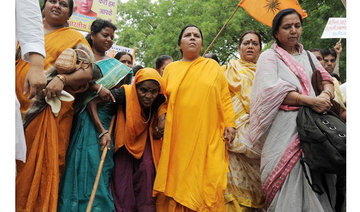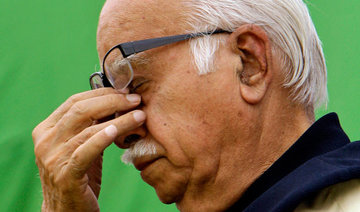NEW DELHI: India’s Supreme Court announced on Tuesday that the hearing for the contentious Babri Mosque demolition case will begin on Feb. 8.
The court rejected a request from the Sunni Waqf Board to postpone the hearing until after the 2019 general elections, and also rejected a plea to have the case referred to a larger bench than the three-member one scheduled to hear the case.
It is 25 years since Hindu supremacist groups demolished the 16th-century mosque, located in the small town of Ayodhya in Uttar Pradesh.
Hindu nationalists claim the Mughal king Babur demolished an ancient temple marking the birthplace of their deity Ram in order to construct Babri Mosque.
When thousands of Hindu zealots tore down the mosque on Dec. 6, 1992, it was the culmination of a long campaign of agitation to turn the site into a Hindu temple, which began in the late 1940s, when Hindu idols were placed inside the mosque, after which it was closed and declared a “disputed structure.”
In the 1980s, the Bharatiya Janata Party (BJP) and affiliated organizations reignited the issue and their campaign culminated in the destruction of the mosque.
Once the mosque was pulled down, rioting and violence broke out across the country. In Mumbai, it was reported that more than 900 people died and over 2,000 were injured.
The infamous Bombay blasts of March 1993, in which 13 coordinated explosions ripped through the city, killing 257 and leaving over 1,000 injured, were reportedly a response to the communal riots.
The primary agitator behind the riots, however — the BJP — emerged from the violence with its reputation enhanced and proceeded to expand its political footprint across the country.
In 1984 the BJP won just two seats out of a possible 545 emerged as the second-largest parliamentary party in 1991 on the back of its Ram temple agitation. By 1996, four years after the demolition of Babri Mosque, the BJP landed 161 seats, increasing that to 182 in the 1998 mid-term poll; enough to enable it to form a coalition government, the first time a Hindu right-wing party had ever done so in independent India. Today, of course, the BJP is India’s ruling party, led by Prime Minister Narendra Modi.
In 2010, the Allahabad High Court ruled that the site of the razed mosque would be divided between Hindus and Muslims, with two-thirds being allocated to Hindus, who would be allowed to keep a makeshift temple they had constructed there. Both sides, however, challenged the order and the ruling was suspended.
Acharya Dharmendra of Vishwa Hindu Parishad, an ideological adjunct of the BJP and one of the accused in the Babri demolition case, said: “On the question of faith, the court cannot decide. The temple issue is related to the country’s and Hindu’s pride and on that there cannot be any compromise.”
Nilanjan Mukhopadhyay, a senior political analyst and author of a popular Modi biography, told Arab News, “There was a political agenda behind the Ayodhya agitation.
“The BJP wants to keep the issue simmering. The basic goal is not to build the temple but to spread the idea of ‘Hindutva’ or cultural nationalism,” he said.
Mukhopadhyay believes the BJP will decide whether or not to “evoke the temple issue” depending on “the assessment of their chances in the 2019 elections.”
Dharmendra dismissed that and the suggestion that the BJP and its allies are using faith to create votebanks.
Leading academic, and former professor at Jawaharlal Nehru University, Imtiaz Ahmad, told Arab News, “It is a dead issue. There is an attempt to revive it, but public sentiment is not in favor of that now. I don’t see much political benefit accruing from this issue.”
Mukhopadhyay questioned the court’s decision to take up the issue at a time when there is an election campaign going on in Gujarat, believing that “a large section of the judiciary is succumbing to pressure from Hindu nationalist forces.”
He believes that the Ram temple agitation has “weakened secularism” in India. “Hindutva, or Hindu majoritarianism, is a political template in India today and mainstream political parties shy away from discussing the rights of minorities,” he said.
Zafaryab Jilani, convener of the Babri Masjid Action Committee, agreed. “Hindu nationalists are harming the larger interests of the country,” he said. “It is important to preserve the secular values of the nation.”
Ahmad remains optimistic that can happen. “We should not lose hope,” he said. “People have understood the designs of the divisive forces ruling the country, and the larger masses in India understand the value of secularism and syncretic tradition.”


























